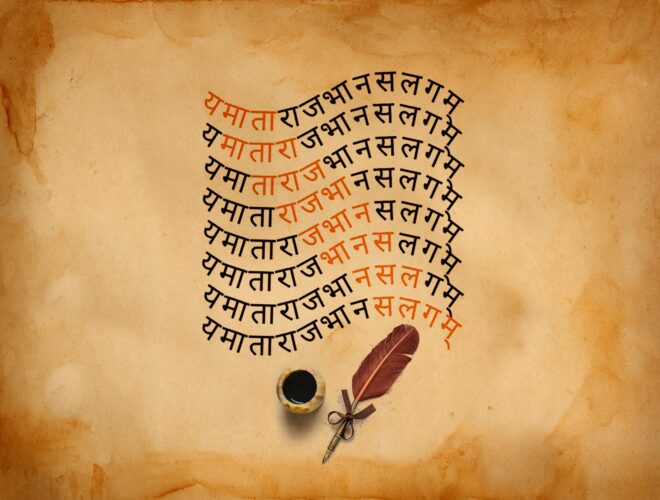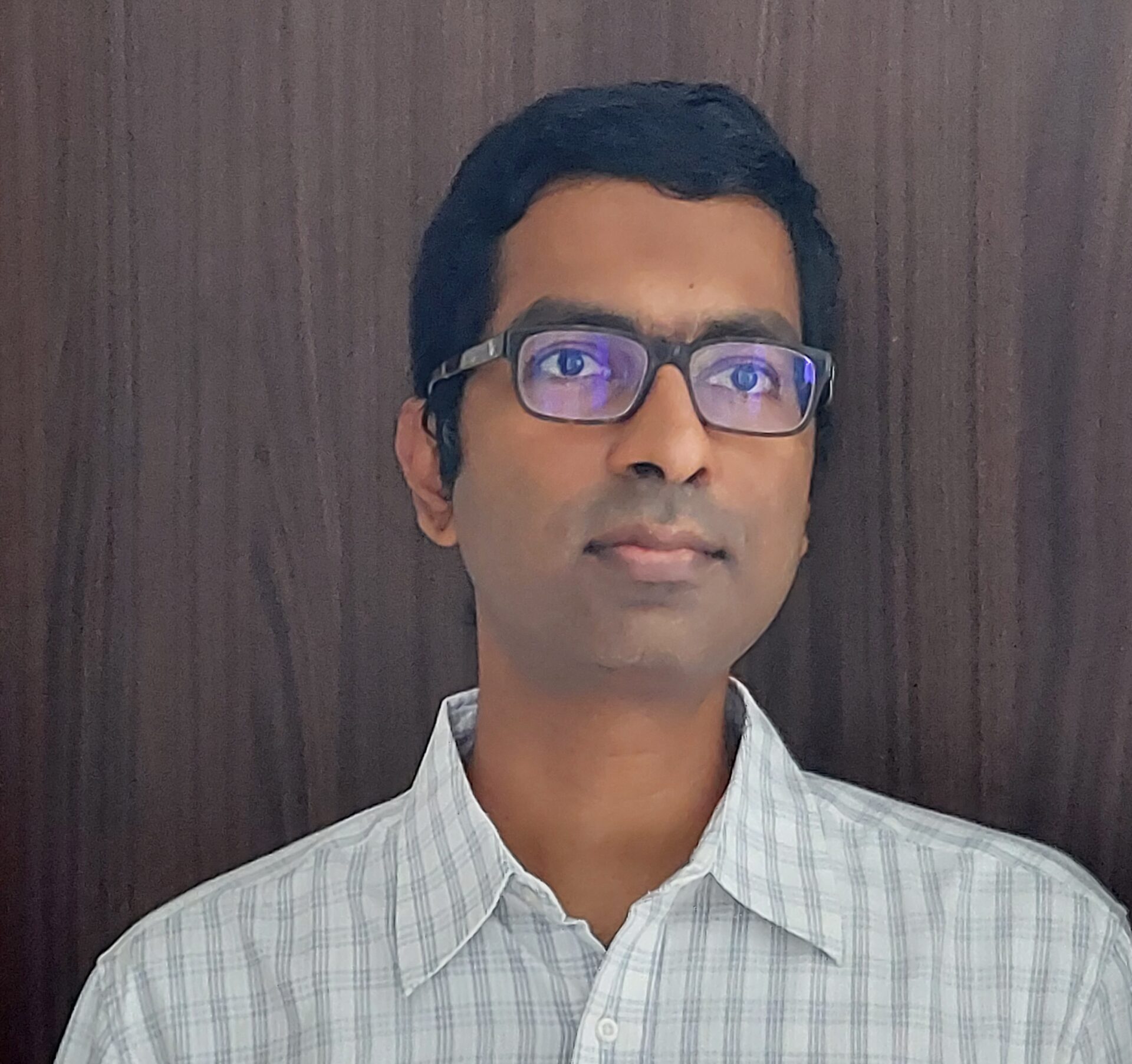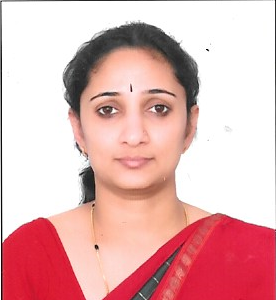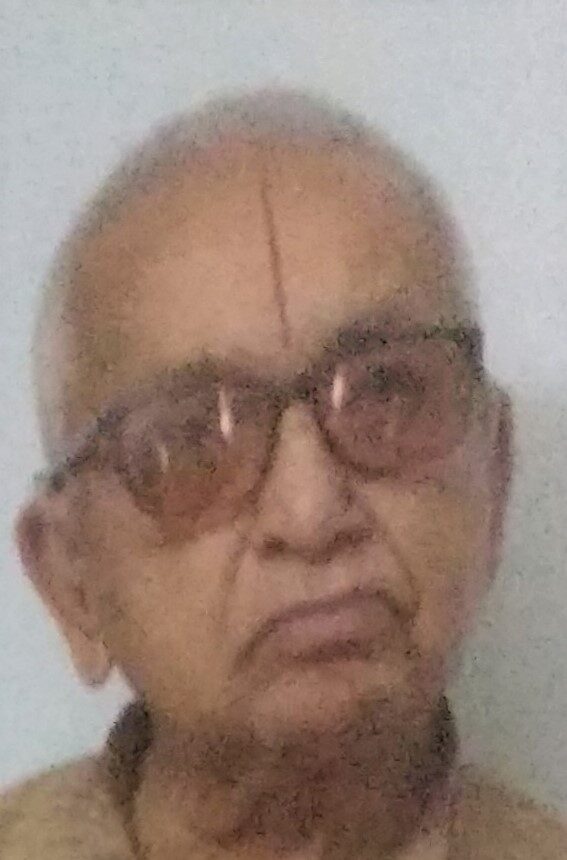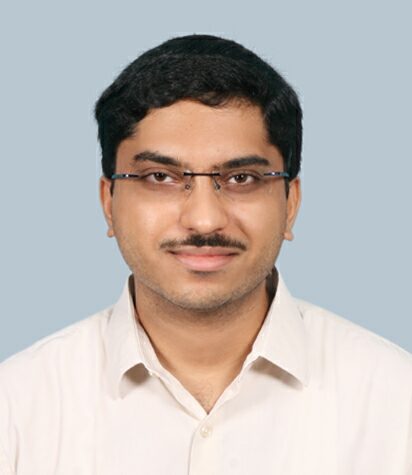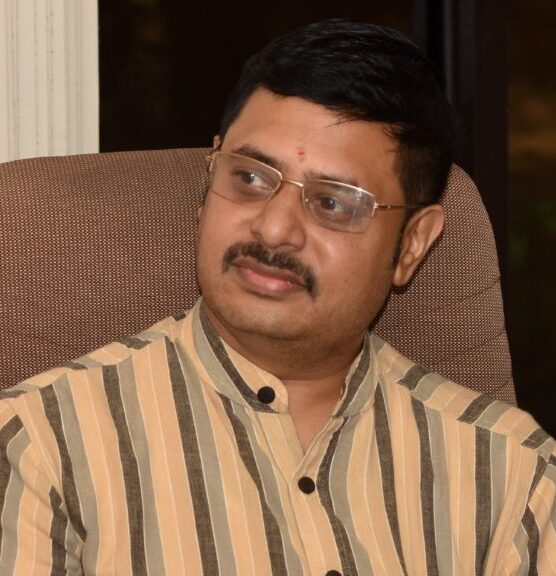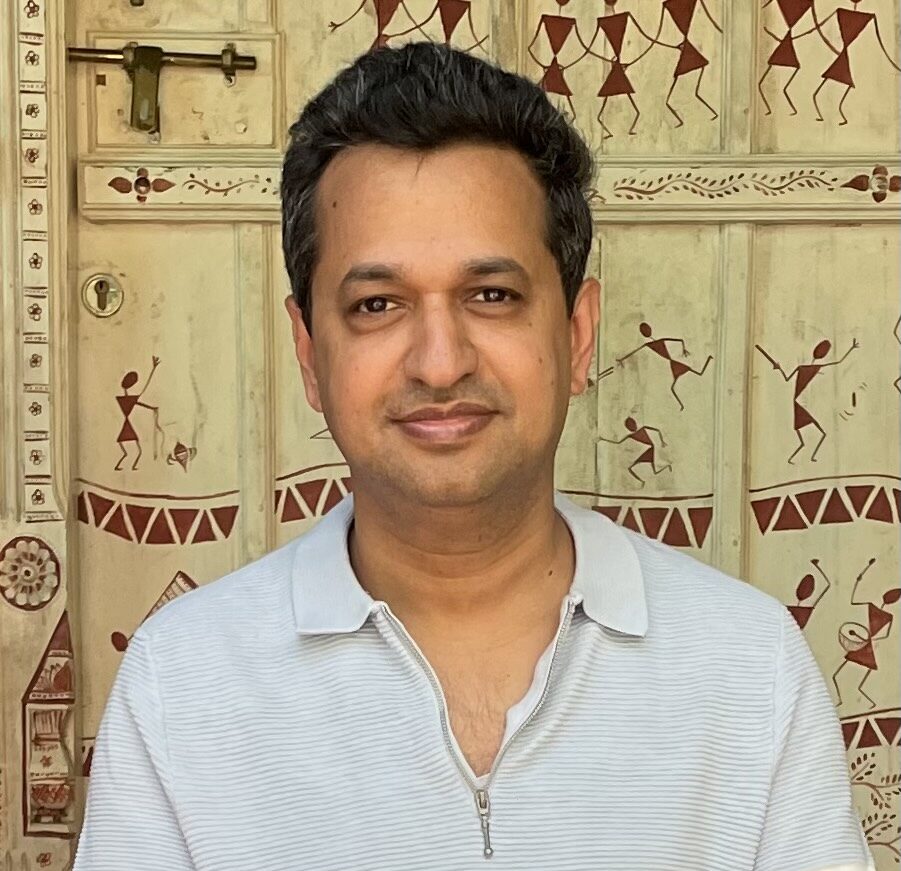The term ṛc (ऋच्) occurring in the name Ṛgveda (ऋग्वेदः) itself has a meaning of “verse”. During learning and recitation of the Veda mantra-s in the traditional manner, it is customary to acknowledge the name of the poetic meter or Chandas (छन्दस्) of the mantra, along with the names of the Ṛṣi (ऋषिः) who first witnessed the mantra and the Devatā (देवता) to whom it is addressed. Along with the discipline of correct utterance of letters that is Śikṣā, and the disciplines of correctly determining the form and function of words that are Vyākaraṇa and Nirukta, the discipline of prosody that is Chandaḥ-śāstra has been accorded the status of a Vedāṅga, a limb of the Veda. Metric verse stands out as an appealing and enduring medium for the expression of Bhāratīya thought, be it the hymns of the Veda, epic and devotional poetry, or treatises on the sciences and arts encompassing both śāstra and kāvya. A testimony to the enduring appeal of the metric verse medium to Bhāratīya hearts and minds across time and space, is that this medium over all others was chosen for Vālmīki’s Rāmāyaṇa from deep antiquity and Kālidāsa’s Raghuvaṃśa in the Classical Period, and also in the Rāmāyaṇa relived by Kambaṉ in Tamiḻ or Tulasīdāsa in Avadhī or Kṛttivāsa in Bāṅgla closer to our times. Sayings which are recalled by Bhāratīya-s to this day and serve to connect them with both the sacred and worldly wisdom of the ages, such as Subhāṣita-s in Saṃskṛtam, kuṟaḷ-s in Tamiḻ, or dohā-s in Avadhī, are in metric verse. The origin of Chandas is close to the revelation of the Veda itself, and it seems like the effect of Chandas ever since has been to set the cadences of Bhāratīya thought itself.
The Chandaśśāstra of Piṅgala, a definitive pioneering text in Chandas like the Aṣṭādhyāyī of Pāṇini in Vyākaraṇa, enumerates poetic meters occurring in the Veda corpus. The problem of enumerating possible meters in verses of a given length, both in Piṅgala’s text and in later texts based on it such as Halāyudha’s and Virahāṅka’s in the second millennium CE, stimulated early Indian efforts in the field of Combinatorics. Chandas, like Vyākaraṇa, developed as a śāstra in its own right, as well as a discipline of expression for other śāstra-s. Poetic meters employed in śāstra and kāvya literature, as enumerated in the 10th century Vṛttaratnākara compendium of Kedārabhaṭṭa, are more numerous than those occurring in the Veda. Of these meters, many that can be recognized as descendants of the Chandas families in the Veda, occur alongside meters such as Āryā which have extensive presence in Prākṛta literature besides Saṃskṛtam. It is in the Āryā meter that the Āryabhaṭiyam, the pioneering mathematical treatise in Saṃskṛtam, and the Gāhā Sattasaī, the pre-eminent poetic compilation in Prākṛta, are both written. The utility of metric verse in aiding memory reinforced by strong initial impression and aesthetic appeal has been recognized and harnessed by thinkers and expositors through the ages. While original verses of the Bhagavadgītā which is mostly in the classic anuṣṭup meter continue to be committed to memory, commentators who provided expositions in prose return to verse to provide summaries that will last in the minds of readers, like Abhinavagupta in tenth-century Kāśmīra giving Saṃskṛtam summary verses in the anuṣṭup meter in his Gītārthasaṅgraha, and D V Gundappa in twentieth-century Karṇāṭaka giving Kannaḍa summary verses in classic Kannaḍa meters in his Jīvanadharmayoga. On etymological grounds, Chandas is said to have the functions of both a protective covering and ornamental covering, and both these aspects are on display in how verses simultaneously preserve the memory and embellish the appearance of worthy ideas.
It is in the realm of kāvya that the artistic possibilities of Chandas are experienced in all their grandeur. The most acclaimed poets in Saṃskṛtam including canonical Pañcamahākāvya-s have valued the discipline of consistently composing all verses in a sarga or chapter in a single meter. While there is artistic freedom in choosing meters, some meters have come to be naturally associated with genres, like the meter Mandākrāntā for the dūta-kāvya genre addressed to messengers for a lover like Kālidāsa’s Meghadūta, and the meter Vasantatilakā for Suprabhātam class of stotra-kāvya accompanying morning worship at temples. Verses of praise being rendered musically goes all the way back to the Veda, where some mantra-s belonging as ṛk-s in the Ṛgveda and recited to invite the presence of deities, are also sung as sāman-s of the Sāmaveda in the presence of the deities. Stotra-kāvya-s or devotional poetry both historically and in modern times, and dṛśya-kāvya-s or Sanskrit drama of ancient times both served to bring Chandas on stage in unison with other performing arts such as music and dance. Verses from the itihāsa-purāṇa and kāvya corpuses can be seen coming most alive in the company of music and dance during Yakṣagāna, Kucipuḍi and Kathakaḷi performances. As a Vedāṅga, Chandas has been likened to the feet of the Veda-puruṣa, and this seems a fitting characterization in the realm of art as well where Chandas has borne aloft the spoken and written word to the heights of expression and experience. The emphasis of this symposium is on Chandas as part of the integral infrastructure of Śāstra, Kāvya and Nāṭya.
***SCHEDULE****
| Time |
Speaker Name |
Topic |
| 09:30-09:35 |
Megh Kalyanasundaram |
Invocation and Welcome |
| 09:35-09:45 |
Arvind V Iyer |
Symposium Concept |
| 09:45-10:15 |
Sreelalitha Rupanagudi & Raghavendra Hebbalalu |
The Rhythm of Chandas – A Practical Demonstration |
| 10:15-10:45 |
GSS Murthy |
Modern explorations into the ancient world of Sanskrit Chandas |
| 10:45-11:15 |
Shashikiran BN |
Chandogati: Unravelling the Beauty of Poetic Metres |
| 11:15-11:45 |
Dr. Shankar Rajaraman |
The interface of Chitrakavya and Chandas |
| 11:45-12:15 |
Dr. Shrikaanth Krishnamurthy |
Verslation, Meters & Music |
| 12:15-12:30 |
Arvind V Iyer |
Symposium Summary |
| 12:30-13:00 |
Dr. Nagaraj Paturi |
Impressions and Closing remarks |
Speakers
Arvind V Iyer
Guest curator and Independent researcher
Arvind V Iyer has a research background in Computational Neuroscience and Biomedical Engineering in areas ranging from decoding of single-neuron responses to analysis of autonomic measures in immersive virtual reality settings. His interests as an independent researcher include Indian languages, appreciation of classical performing arts, and contemplative practices.
Sreelalitha Rupanagudi
Engineer, Musician, Poet
Sreelalitha, an engineer by profession and training, has been a student of Sanskrit for more than two decades. After basic training in school and college, she has been fortunate to be associated with Samskrita Bharati during her formative years as a student and later as a volunteer. She has been part of Shatāvadhani Dr. R. Ganesh's study circle for over a decade and a half, and Padyapaana since its inception. A published author of literary reviews, she enjoys writing stories in Kannada and composing thematic kāvyas in Sanskrit. She has donned the role of pracchaka in avadhānas in various departments, like Dattapadi, Kāvyavāchana, and Aashukavita. She also pursues Karnatak music under the tutelage of Vidushi Dr. T S Sathyavathi. She works for ARM.
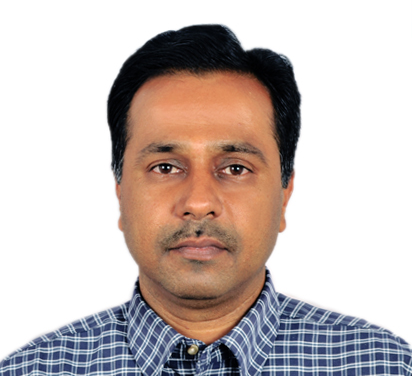
Raghavendra Hebbalalu
Engineer, Poet, Blogger
Raghavendra Hebbalalu, an engineer by training and profession, is a lifelong student of Sanskrit. He has been associated with Samskrita Bharati, as a student and a kāryakartā, having conducted sambhāshana shibirams in the USA and India. He has a Masters in Sanskrit from Karnataka Samskrit University, Bengaluru. He evinces a keen interest in bhAratīya and western philosophy. He has been fortunate to be a part of Shatāvadhani Dr R Ganesh’s study circle on Kāvya and Alankāra Shāstra. Associated with Padyapaana as an on and off contributor, he enjoys composing verses about modern themes in classical metres in Sanskrit and Kannada, posting frequently on Twitter. He has participated in several avadhānas as a pracchaka across categories. He is currently translating DVG's magnum opus, Mankutimmana Kagga from Kannada to Sanskrit. He and his wife have translated another great work of DVG, Jivanadharmayoga from Kannada to English. He has blogged in the past and is set on starting again. He works for McAfee.
GSS Murthy
Author, Advisor (Ops.), Retd. Deptt. of Telecom, GOI
Post-graduate in telecom engineering at IISc, Bangalore. Joined Indian Telecom Services, Govt. of India and retired as Advisor[Operations] to The Dept. of Telecom, GOI. Studied Sanskrit under traditional scholars as an extra-curricular during student days and resumed Sanskrit studies after retirement. A collection of his Sanskrit poems, under the title, "Chandrikaa" has been published, so also his translation of Ibsen's "Doll's house" under the title, "putrikaa gruham". His Kannada translation of Sri Vedantadesika's "SubhashitanIvi" has been published by Academy of Sanskrit Research, Melukote. He has written programs in Java for Sanskrit Sandhi and identifying Sanskrit Metres. He has published 3 papers in the area of Sanskrit Chandas (two in Annals of BORI and one in Prachi Prajna).
Shashikiran BN
Contributing Editor, Prekshaa
Shashi Kiran B N holds a Bachelor's degree in Mechanical Engineering and a Master's Degree in Sanskrit Aesthetics. He works as a Contributing Editor of Prekshaa, an online journal of Indian Culture and Philosophy. He is a recipient of the prestigious Sahitya Akademi Prize (2021) for Translation, which he received along with Shatavadhani Ganesh, for their Sanskrit translation of Devudu Narasimha Shastry's Mahaabraahmanah, which is a Kannada novel.
Dr. Shankar Rajaraman
Poet, Psychiatrist, Associate Professor, Centre for Ancient History and Culture, Jain University, Bengaluru
Shankar Rajaraman is a MBBS doctor and psychiatrist by training, Sanskrit poet by passion, and researcher by profession. He is a recipient of the Badarayan Vyas Samman from the President of India for his contribution to Sanskrit language and literature. His doctoral thesis was on an interdisciplinary topic that bridged the psychology of emotions and Sanskrit aesthetics. He has a special interest in Chitrakavya (wonder poetry), having composed several original Sanskrit works, such as Devidanaviyam and Chitranaishadham, in this genre. His personal expertise in composing Chitrakavya allows him to appreciate the nuances of Chandas and the extra constraints posed by it in the context of Chitrakavya. He is presently Associate Professor, Centre for Ancient History and Culture, Jain University, Bangalore.
Dr. Shrikaanth Krishnamurthy
Pyschiatrist, Poet, Translator, Musician
Shrikaanth Krishnamurthy is a psychiatrist from Bengaluru India, living in England. A trained vocalist and a composer in Karnataka Sangeetha, he also writes in several languages- Sankethi, Kannada, Tamil, English, Sanskrit to name some. He is the first Vaaggeyakaara to create musical compositions in the Sankethi language. He also writes verses in English set to classic Indian Meters (Chandas). His Haiku, Tanka, Haibun and Haiga have been published in reputed international journals and anthologies and won prizes. He has translated many works between languages. Notable are the translations of the magnum opus Makuthimmana Kagga to Sankēti in the same meter, Sumati Shataka from Telugu to KannaDa, the renowned KannaDa novel Vamshavriksha to Sankēti and Classical Tamil poetry to other languages.
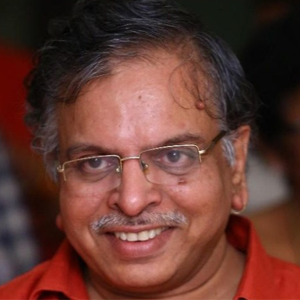
Dr. Nagaraj Paturi
Senior Director and Chief Curator, INDICA
Trained in Sanskrit and Advaita Vedanta by his hyper-polyglot, polymath and spiritually accomplished sakala-shaastra-paarangata father, late Sri Paturi Sitaramanjaneyulu garu, Dr Nagaraj Paturi is seriously committed to the transmission of Vedic sciences to the present generation. In his PhD thesis (1998, University of Hyderabad), he developed an Indic Model of Myth Criticism of Literature and in his MPhil (1987, University of Hyderabad), he foregrounded Vakyapadiya as the theoretical foundation of the Ashtadhyayi. In addition to over 50 publications and about 60 conference/seminar/workshop papers, Dr Paturi has designed several courses pertaining to the contemporary applications of Vedic Sciences and has been successfully teaching them and getting them taught. Formerly Senior Professor of Cultural Studies FLAME School of Communication (& FLAME School of Liberal Education) and a Visiting Professor, University of Chicago (USA), Dr Paturi is currently Senior Director and Chief Curator at INDICA, a Distinguished Professor, Curriculum Designer, Executive Committee Member, Board of Studies, MIT School of Vedic Sciences (Pune, Maharashtra), Member, Board of Studies at Kavikulaguru Kalidasa Sanskrit University (Ramtek, Maharashtra) and Rashtram School of Public Leadership (Sonipat, Haryana). He is also the Editor-in-Chief of International Journals of Studies in Public Leadership and is a member of the Advisory Council of Veda Vijnana Shodha Samsthanam (Bengaluru, Karnataka). He has provided consultancy to numerous culture research, theatre, and dance innovation projects. He has authored scores of creative writing works for Classical Dance, Modern Theater, and magazines and has delivered several series of talks and other programs on Radio and Television channels.
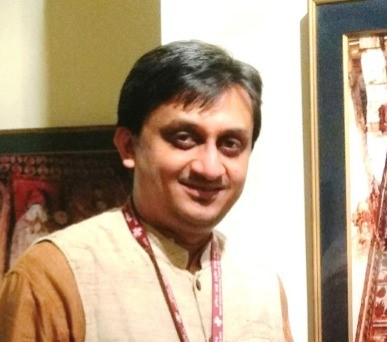
Megh Kalyanasundaram
Host, Director – Special Projects, INDICA
Megh Kalyanasundaram is an Indian citizen with close to nine years of lived experience in China, an alumnus of ISB and is currently Director Special Projects at INDICA. His post-graduate specialization in Strategy, Leadership and Marketing included a study of research methods. His professional experience includes stints as a Market Leader at a Global Fortune 50 firm, as Head of Business Development at a leading Indian talent development multinational and he has served a term on the Board of a Shanghai-based not-for-profit. His academic research interests and 20+ papers span some aspects of ancient Indian chronology, Indian Knowledge Systems, Landscape in Indic texts, Ancient Indian Jurisprudence, Ideas of India and Philosophy. For his creative contribution to the first edition of the International Day of Yoga, he was invited by the Permanent Mission of India in the United Nations to attend the inaugural event at the UN. Other professional and pro-bono pursuits have included building differentiated digital platforms for Indic texts targeted at specific learning and research needs and music. His research-based compositional Sanskrit album 'Bhārata and her Kāśmīra' has been listed by the Indira Gandhi National Center for the Arts (IGNCA) while his subsequent album 'Indian Knowledge Systems and Yāskācārya's Nirukta' has recently been accepted for listing by the Vedic Heritage Portal. In 2022, Megh was invited by the National Museum Institute (NMI) to contribute content for multiple projects currently underway at NMI, including ones on Jammu Kashmir & Ladakh and Kedarnath.

